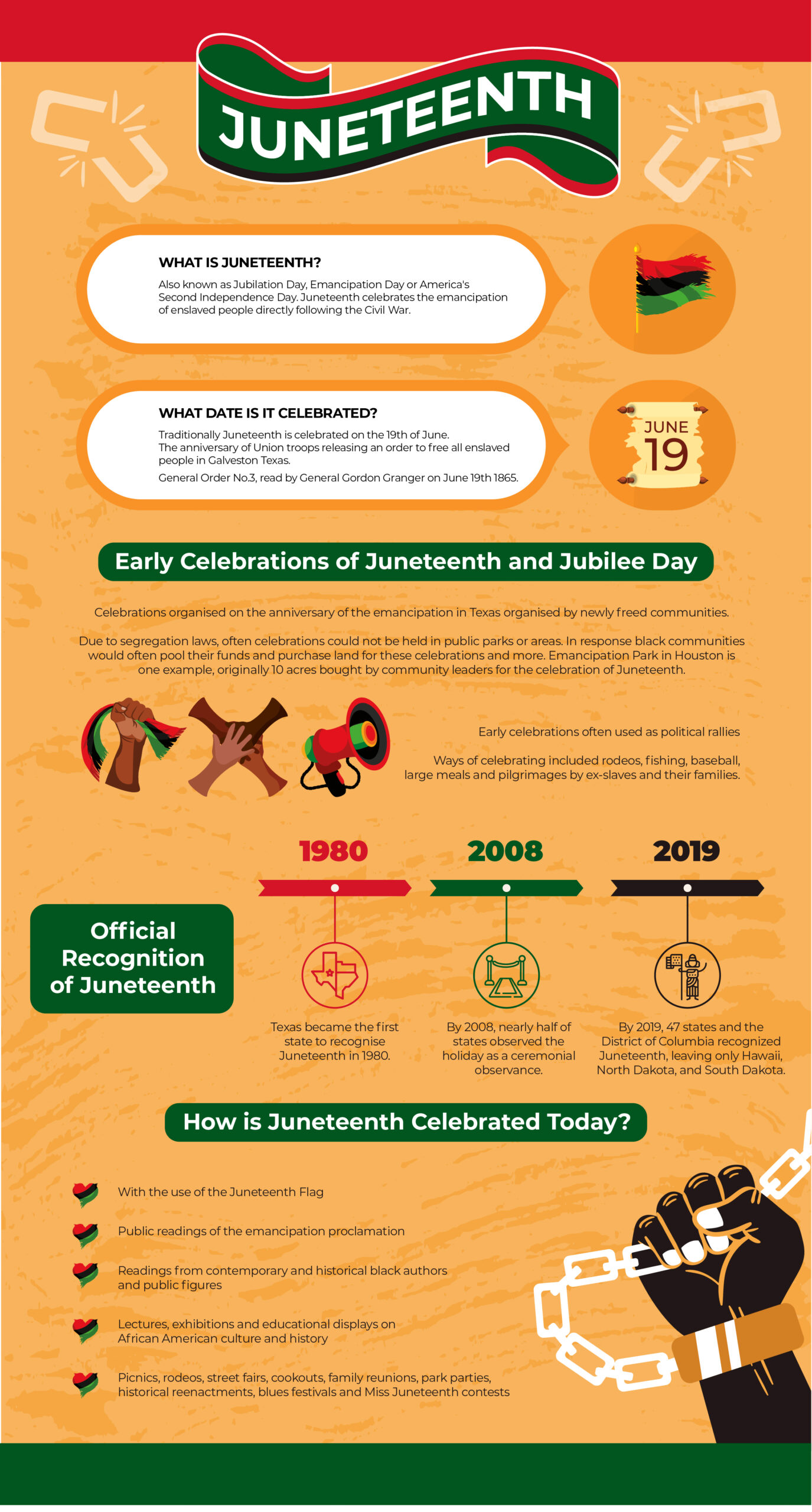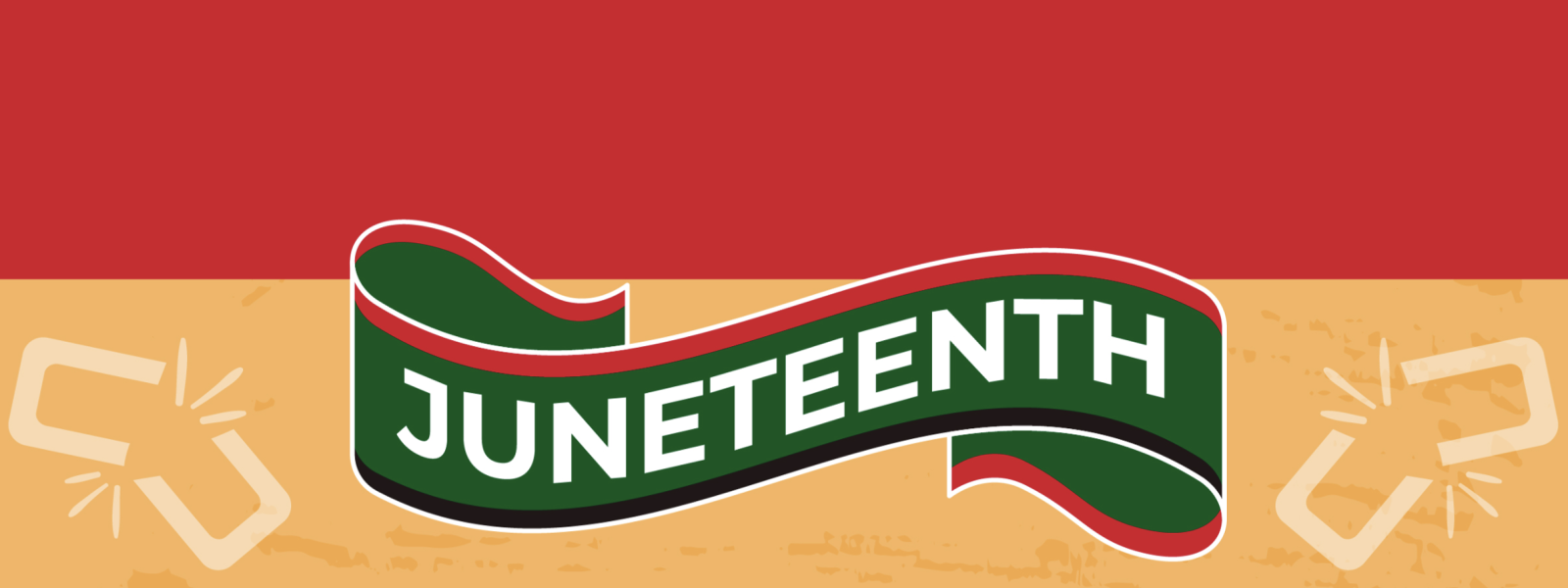Happy Juneteenth: A history in Infographics.
Happy Juneteenth! It’s a phrase you’re likely to see all over the internet today and tomorrow. But what is Juneteenth? Where did it come from? Juneteenth is an important day of remembrance which people in the US and abroad should know a lot more about.
With that in mind we’ve decided to take an in depth look into the meaning of Juneteenth, the history of the celebration and the traditions surrounding the day across the country. You may have seen Juneteenth in the news or on social media recently. As of June 18th 2021 the federal government recognise Juneteenth as a national holiday! This is huge news for proponents of the holiday who have long felt the day deserved more recognition.
On June 14th, Juneteenth entered the list of public holidays in Louisiana. This might not seem like big news for the rest of the states, but to many it was an important step in recognition for the celebration. But this might be getting ahead of ourselves. Let’s start from the very beginning. What is Juneteenth?
Happy Juneteenth! But what is it?
Depending on where you are from in the United States, you may know Juneteenth by other names. Whilst today Juneteenth is fairly widespread, there have been different names over the years. Jubilee Day, Emancipation day or Liberation day, the holidays name has changed throughout the years, the meaning however hasn’t. Juneteenth celebrates the emancipation of those enslaved by confederate states in the period directly following the American Civil War.
Around the country, people celebrate Juneteenth on June 19th. The anniversary of the celebration is June 19th 1865. This is an area of some confusion for people. Any American school student should be able to tell you that President Abraham Lincoln had officially put an end to slavery 2 and a half years earlier with the emancipation proclamation. Why is this specific date the one on which we celebrate emancipation? The answer is more simple than you think.

Why is Juneteenth Celebrated on June 19th?
The Emancipation Proclamation was the official end of Slavery in the United States. However the enforcement of the proclamation relied heavily on the advance of Union troops. Many of the confederate states were remote and so it took some time for the Union Troops to advance and enforce the proclamation.
As Union troops advanced through confederate states they enforced the emancipation proclamation and freed enslaved men, women and children. As communities were freed from slavery, celebrations would break out, often known as jubilees. These jubilees followed the advance of the Union army and occurred at various dates throughout the southern United States.
States like Delaware and Kentucky kept practising chattel slavery until 1866 and some of the Indian territories also held out with the practise. The last confederate state to hold slaves was Texas however. This is why we celebrate on the anniversary of the emancipation of slaves in Texas. It marked the end of widespread ownership of human beings in the South, and therefore the remainder of the USA.
Union Troops announced complete emancipation on June 19th 1865 in Galveston Texas.
The people of Texas are informed that, in accordance with a proclamation from the Executive of the United States, all slaves are free.
General Gordon Granger, June 19th 1865
Due to this being the last real stronghold and therefore chronologically the last emancipation, this is the day which quickly became celebrated. That’s right! Juneteenth isn’t, as some believe a celebration of the end of slavery. As stated previously some states continued practicing slavery until 1866.
Early Juneteenth Celebrations
On the one year anniversary of the Union armies general order 3. This order informed the people of Texas that slavery was officially over, causing widespread celebration among the freed community. Jubilee Day was born. Men women and children of these newly freed communities would begin a celebration every year on the anniversary of their emancipation in Texas.
Jubilee Day, as it was then known, was as important politically as it was culturally. Rallying the communities politically with voting instruction and education were vital to the survival of these new freedoms. That’s not to say it wasn’t a joyous occasion. However you look at it, early Juneteenth celebrations were joyous occasions for these communities. This tradition continues to this day.
Early celebrators of Jubilee Day were hampered by segregation laws which forbade the newly freed slaves from using public parks and areas for their celebrations. In response black communities across Texas would organise collections and pool funds to buy plots of land which would then be used for celebrations.
The event was added to the yearly calendar of events in Texas by 1872 and began to really gather steam as a public holiday. In 1898 an estimated 30,000 men, women and children met at Booker T. Washington park in Limestone County, Texas for the Juneteenth celebrations. By the 1890s the name Jubilee Day was abandoned and celebrations are now cemented as Juneteenth.
Decline of Juneteenth
The early 20th Century saw a rapid decline in popularity for the celebration. The Jim Crow laws in the south made black people second class citizens which negatively affected the celebrations. Another large factor in the decline is quite simple. Previously options and opportunities for African Americans were slim to none. With Emancipation the
The Great Depression was another factor in the decline of Juneteenth in this period. As work opportunities dried up the priority of taking a day off for Juneteenth became less and less of an option for working families.
Beginning in the 1930s a revival of sorts for the holiday began to take shape. The annual Texas State Fair became a focal point for the celebrations. In 1936 an estimated 150,000 – 200,000 people joined celebrations.
The Great Migration
From 1940 through 1970, in the second wave of the Great Migration, more than five million black people left Texas, Louisiana and other parts of the South for the North and the West Coast. With them the celebrations of Juneteenth were brought from Texas to New York, Los Angeles and other major cities as they went.
The Civil Rights Movement of the 50s and 60s saw another revival of Juneteenth celebrations. As many black Americans tied the event to their struggle for equality, many protesters and activists began wearing Juneteenth buttons.
Official Recognition and Growth
The Texas legislature declared Juneteenth to be a holiday of significance in 1979, making Texas the first state to make it an official State Holiday in 1980.
In 1997, following attempts to have Juneteenth Independence Day officially recognised, Congress passed Senate Joint Resolution 11. Joint resolution 11 recognised the day as important. However activists are continuing to work towards pushing Congress to recognise Juneteenth as a national holiday, with some successes! As of the time of writing this article, President Joe Biden has just passed a law making Juneteenth a national holiday. Whilst this meant rewriting large parts of the article this is brilliant news for the movement and America as a whole.
In 2020 and 2021, State governors in New York, Virginia, New Jersey and Louisiana have all recognised Juneteenth as a paid day of leave for state employees.
The need for Further Recognition of Juneteenth
The recognition for the day of celebration is far from widespread. Despite attempts and protests, Juneteenth was not an official federal holiday despite most states recognising it in some way or other. The Senate did however pass a simple resolution in 2018 to honor the day. Despite these steps many believed these steps were far too lacklustre for America’s second independence day!
Most states do recognize Juneteenth in some way, either as a ceremonial observance or a state holiday. As mentioned before, Texas became the first state to recognise Juneteenth in 1980. By 2008, nearly half of states observed the holiday as a ceremonial observance. By 2019, 47 states and the District of Columbia recognized Juneteenth, leaving only Hawaii, North Dakota, and South Dakota.
As of June 18th President Joe Biden officially passed a law recognising Juneteenth as a National Holiday. A huge boost and many believe this to be an important step. Reports suggest that this years Juneteenth will have an added boost to celebrations across the country. There are however still steps to make and it will be interesting to see how far this goes. We can’t ignore just how important this is for the African American community however.
How is Juneteenth Celebrated
Juneteenth is the longest running African American holiday in the US Although the early years of the Holiday saw different kinds of celebrations. Usually with baseball, fishing and rodeos. Another key aspect would be a pilgrimage of former slaves and their families to Galveston Texas.
Nowadays the celebration is a much more public observance, with people of all races and cultures joining the festivities and remembrances. Traditionally celebrations will feature one or more of the following
- Public readings of the emancipation proclamation
- Readings from contemporary and historical black authors and public figures
- Lectures, exhibitions and educational displays on African American culture and history
- picnics, rodeos, street fairs, cookouts, family reunions, park parties, historical reenactments, blues festivals and Miss Juneteenth contests
Juneteenth is seen by many as an opportunity to instill pride in African American heritage and culture. The holiday is an opportunity to celebrate many aspects of African American culture. Educational aspects are also commonly linked with voter registration drives, an important tool in furthering equality. As the holiday and awareness thereof spreads it helps to know as much as possible about the history of the day.
Have we missed anything important? What’s your favourite thing about Juneteenth? What will you be doing to celebrate? Let us know by email or on social!
